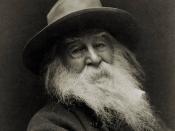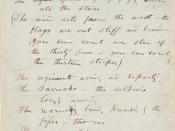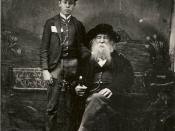I do not believe that science and nature are two separate entities, but that they intertwine to create the world as a whole. In the poem, "The Learn'd Astronomer" by Walt Whitman, the speaker sharply divides the two, leading the reader to think that one is possibly more beautiful than the other. He even backs away from a scientific lecture about the universe only to gaze up at the stars. To me, the facts and figures that comprise the world are just as important as the world itself.
Whitman seems to imply that over-analyzing nature somehow takes away from seeing it in its true splendor, and that the lecturer himself is blind to the simplicity of the universe around him. If this is the poet's intention, then I would have to disagree. The mathematical figures that comprise the galaxies are equally as beautiful as the galaxies themselves. When he tells his readers, "When I, sitting, heard the astronomer, where he lectured with much applause in the lecture-room, How soon, unaccountable, I became tired and sick," Whitman seems to say that too much knowledge about these things can be an annoyance.
In contrast, I see mankind's curiosity as part of the universe, and I cannot appreciate the whole without appreciating the sum of its parts.
The second item that this poem makes me wonder about is Whitman's possible objections toward scientific discovery. The poem, written in the nineteenth century, illustrates some of the scientific development and breakthroughs going on in that era. Whitman states that, "I was shown the charts and the diagrams, to add, divide, and measure them," and later acknowledges the lecturer's ideas as genuine and new when it is met with, "much applause in the lecture-room." Of course, it is a scientist's job to pick...


